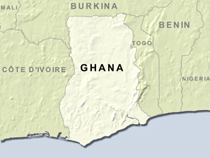2006年VOA标准英语-Experts Discuss Impact of Climate Change on Wat(在线收听)
By Efam Dovi
Accra
24 September 2006
 |
||
-----
The U.N. projects that, by 2025, around 480 million people in Africa could face water scarcity, or the potential for conflicts over water, as supplies decrease and demands for water increase.
Moise Sonou is senior water development officer in the Africa regional office of the Food and Agriculture Organization. He says African countries need to work together to deal with the situation.
"We know that the scenarios are not certain for the time being, but the impact, as has been forecast so far, will be beyond the means of the individual countries to cope with," said Sonou. "But, if we start preparing for it now, we certainly will be able to alleviate part of the risk."
The experts, meeting under the auspices of the U.N., say Africa is most vulnerable because of poor capacity to adapt to climate change, the harsh atmospheric conditions and poverty. All of these make it difficult for people to cope with the impact of climate change.
Kojo Ageman Bonsu, national climate change coordinator in Ghana, stressed the importance of information-sharing in the region.
"So, it is important for us to learn from each other. Ghana, for example, has done vulnerability assessments in almost all the sectors," noted Bonsu. "So, the national level activities are critical. But, at the same time, sharing information within the region is very important. And the problem we have in Africa is actually information-sharing."
The participants say changes in climatic conditions are already affecting many African countries. For instance, they said, Ghana is facing an energy crisis because of a shortfall in rain, while, in Ethiopia, flooding has displaced thousands of people.
Amare Hailu, from the Ethiopia national meteorology agency, says prediction is key.
"It needs the skill of predicting the climate. When we come to Ethiopia, Ethiopia is a mountainous area, different micro-climate systems are affecting the country," said Hailu. "We cannot predict the whole system at once, the temperature of the highland areas is not much affected when we come to lowland areas it was seriously affected. So, knowing this and the planning to that, and the working to that is the main thing that we have to be concerned about."
The three-day African regional meeting is one of several preparatory workshops in advance of the U.N. Framework Convention on Climate Change conference scheduled for November in Kenya.